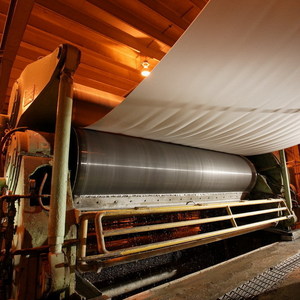Domtar inaugurates commercial lignin production




Domtar Corp.
March 12, 2013
BY Domtar Corp.
Domtar Corp. has announced that it has successfully installed a commercial-scale lignin separation plant at its Plymouth, N.C., mill, the first U.S. facility of its type in more than 25 years. The production of BioChoice lignin began in February, with a targeted rate of 75 tons per day, destined for a wide range of industrial applications as a bio-based alternative to the use of petroleum and other fossil fuels.
The successful installation of commercial-scale lignin removal capacity at the Plymouth Mill is the culmination of a research and engineering project launched by Domtar in 2010. This project was further boosted when the USDA and the U.S. DOE awarded the company a grant through the Biomass Research and Development Initiative. Domtar’s lignin operation sets a new path for the industry and also marks the latest sustainability milestone for a company that has long been recognized as an industry leader in forest certification and environmental stewardship.
“Our vision is to be a global leader in fiber-based innovation,” said Bruno Marcoccia, Domtar’s director of research and development. “A big part of this is our focus on partnering with best-in class collaborators to develop new products and markets for a wide portfolio of initiatives, like BioChoice.”
“The possibilities for making a real difference in terms of offering manufacturers a bio-based alternative to the use of petro-chemicals is truly exciting,” said Hasan Jameel, a professor in North Carolina State University’s Department of Forest Biomaterials. “This is a big win for sustainability on two counts—Domtar improves the efficiency of its pulp-making process, and at the same time the market gets a reliable, high-quality source of this underused material with so much potential.”
Advertisement
A wide range of potential applications for BioChoice lignin exist, including fuels, resins and thermoplastics.
Advertisement
Related Stories
The U.S. Department of Energy Bioenergy Technologies Office (BETO) announced up to $23 million in funding to support research and development (R&D) of domestic chemicals and fuels from biomass and waste resources.
The U.S. DOE has announced its intent to issue funding to support high-impact research and development (R&D) projects in two priority areas: sustainable propane and renewable chemicals and algal system cultivation and preprocessing.
Sens. Sherrod Brown, D-Ohio, and Pete Ricketts, R-Neb., in August introduced the Renewable Chemicals Act, a bill that aims to create a tax credit to support the production of biobased chemicals.
The Chemical Catalysis for Bioenergy Consortium, a consortium of the U.S. DOE’s Bioenergy Technologies Office, has launched an effort that aims to gather community input on the development of new biomass processing facilities.
USDA on March 8 celebrated the second annual National Biobased Products Day, a celebration to raise public awareness of biobased products, their benefits and their contributions to the U.S. economy and rural communities.
Upcoming Events










